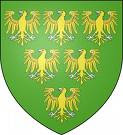The royal residence at Kings Langley was probably the favourite residence of Edward II, and it could possibly be the place where he clapped eyes on Piers Gaveston for the first time.
There had been a hunting lodge at Langley from the time of Henry III, but it wasn’t until the time of Edward’s mother, Eleanor of Castile, that a ‘royal residence’ became firmly established. Most of the building was done between 1279-1281. In 1302, the palace was given to Eleanor’s son, Edward II. Edward had in fact spent a great deal of time there anyway.
In 1308, Edward II established a Dominican Priory at Kings Langley. The Dominicans were a personal favourite of Edward II out of the many ecclesiastical orders in England at the time. It was this priory that would become the eventual resting place for Piers Gaveston after his murder in 1312.
The priory and church were built to the north of the palace. The building was not completed until the 1360s, but in 1312 Edward, not surprisingly, had the church consecrated. Piers himself was not laid to rest there until 1315 (more on this in a later post).
Kings Langley also became a favourite residence of Edward III, and throughout his reign he continued to add to the Priory and Church. Six large stained glass windows were added and a large bell were installed in the church during his reign. His grandson, Richard II, would also be buried here. With the exception of Blackfriars, the church at Kings Langley was the largest Dominican house in England.
Whilst at University at Reading, I did my best to find any evidence of the priory/palace at Kings Langley – and this was in pre-Internet days! There was very little information to be found, and I never got to visit what remains. The English Reformation saw to that – the friars were dismissed and the church fell into decay. The remains of Richard II had been reinterred by Henry V in Westminster Abbey. The land was sold to William Houlker and he demolished the priory – all that remained was one room which was used as a barn. The church itself was reduced to rubble.
We have some idea of the dimensions of the priory/church due to a farmer in the nineteenth century – ‘Farmer Betts’ , who in 1831 recorded the dimensions and as much detail as he could. Sir Gilbert Scott, visiting the site that year, wrote ‘the Church must have been as fine as Westminster Abbey,’ and there was evidence of Purbeck marble bases to the pillars. Farmer Betts decided not to restore what was left, but flattened what was left to use as farm land. Enough to make you weep, eh?
Today, the site is home to by the Rudolf Steiner School. I did write to the Kings Langley historical society a few years ago asking what actually remained, and whether there was any evidence of Piers Gaveston’s tomb. I was told that if anything did exist, it was below the school. A friend of mine who lives not far from the school set off for a walk around it, but could see nothing. Who knows, one day, when I win the lottery, it may be a case of the Favourite Under the School, rather than the King in the Car Park.
Here's a sketch of the priory - or all that remains of it -
from the 19th century. Opposite is the Rudolf Steiner School,
built on the site of the priory/church.
Source:
http://www.kingslangley.org.uk/index.html
1 day ago




